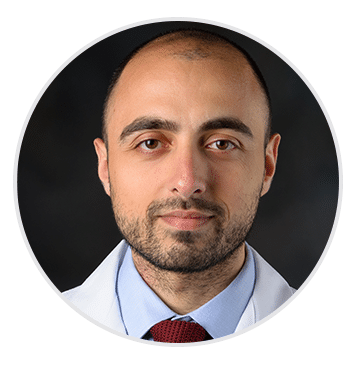Researcher Spotlight: Paolo Strati, MD
The University of Texas

Macrophages are large white blood cells that present antigens within the human immune system, an important step in signaling the immune system to attack disease,. Researchers are developing therapies which help increase the activity of macrophages in hopes of inducing a more effective response to treatment. Dr. Strati’s LCRMP project will test a combination of a monoclonal antibody targeting the protein CD47, which can increase the anti-tumoral activity of macrophages, with rituximab (Rituxan) and lenalidomide (Revlimid) in patients with relapsed or refractory B-cell lymphomas. Dr. Strati will also test tissue samples to identify the changes the therapy induces in the tumor microenvironment, in hopes of identifying additional therapeutic targets. “I believe this project will lead to a significant change for patients, opening the therapeutic horizon to novel, safer and more effective macrophage checkpoint inhibitors and combinations,” Dr. Strati says.
Dr. Strati received his MD from the University Vita-Salute San Raffaele in Milan, Italy, where he also completed a residency, before an initial fellowship in leukemia at MD Anderson Cancer Center. His initial studies focused on chronic lymphocytic leukemia (CLL). Further studies took him through a fellowship at Queen Mary University in London and a residency at Mayo Clinic, Rochester, before returning to MD Anderson for a clinical fellowship in hematology-oncology, and where he recently accepted a position as Assistant Professor. “Thanks to my current mentor, Dr. Sattva Neelapu, a world expert in the field of lymphoma microenvironment, I am now working on applying the expertise I developed in CLL/SLL to the treatment of more aggressive B-cell lymphoma,” Dr. Strati notes. He adds that Dr. Neelapu has been an immense source of inspiration. “I can relate to his experience, as an international medical graduate who immigrated to the U.S. and restarted from the bottom, driven by passion and commitment, to achieve his goal – to help patients with lymphoma.”
Dr. Strati expects that his participation in the LCRMP will be helpful not just to his current project, but the broadening of his expertise. “The field of macrophage checkpoint inhibitors is still new and largely unexplored, highlighting the importance of collaborative efforts and collegial study design. The experience and guidance from my LRF mentors will be invaluable to the study’s development,” he says. “In addition this program will be crucial to extend my research from CLL/SLL to other lymphomas. This transition is a challenge, and I will need strong mentorship and continuous advice to be successful. As such, I consider myself blessed to be part of this program.”


